May 5, 2006
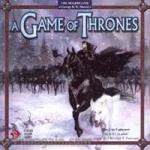 Fantasy Flight is once again hard at work publishing details about their "Storm of Swords" expansion to the succesful "A Game of Thrones" strategy game.
Fantasy Flight is once again hard at work publishing details about their "Storm of Swords" expansion to the succesful "A Game of Thrones" strategy game.
Each article focuses on one of two Houses and how their House and leaders cards will effect game dynamics in the expansion. House Greyjoy's article details their mastery of the the quick raid, while House Martell loves the bring the full-on smackdown.
We have to be honest with you - if you're not already a fan of the Song of Ice and Fire novels from George R.R. Martin, and if you're not a fan of the A Game of Thrones games, then these articles don't have nearly enough substance to gather your interest. However, those true fans get a nice glimpse of the cool stuff coming down the pipe this June.
Critical Gamers Staff at
Permalink

May 4, 2006
 We have this crazy notion that most review sites skew their scores towards the positive. Essentially one or two stars out of five are almost unheard of.. and that's not fair. If 2.5 is average, smack in between 'great' and 'crap-awful', then how come just about everything in the world is a 3+? Not to get depressing - but last time we check ed the outside world it wasn't black and white but pretty grey.
We have this crazy notion that most review sites skew their scores towards the positive. Essentially one or two stars out of five are almost unheard of.. and that's not fair. If 2.5 is average, smack in between 'great' and 'crap-awful', then how come just about everything in the world is a 3+? Not to get depressing - but last time we check ed the outside world it wasn't black and white but pretty grey.
So please don't shower us with hatemails when you see a low score for something you love. We'll just reply with a fruit basket containing a simple note with the link to this page saying "We told how it is." If you disagree with our points about what was good, what was bad, and why, well then.. that's different.
Without further adieu, our 5 star 'system':
- 0 Stars : Fill your gas tank and grab a coffee (to go), because the only satisfaction you'll get from owning this product will occur the moment you abandon it on the side of a distant freeway.
- 1 Star : The potential of this product is obvious, but it falls short in almost every way. It'll end-up on the bottom of your game stack, sitting dusty and neglected.
- 2 Stars : This product has a few good things going on, but the bad elements overshadow them. Only for people who are enthusiastic over the subject matter.
- 3 Stars : A very strong product for the intended audience. A product that 'works' out of the box.
- 4 Stars : This product is so good that it will interest almost everyone, even folks who normally wouldn't' give 'similar products' their extra umbrella in a rainstorm.
- 5 Stars: : Lie, loot, cheat, .. sell some blood if you have to, just get this product. We'll still be playing it when we're 80.
The word "product" should be replaced with "game" in almost every case, but we do sometimes review gaming peripherals, so we thought we'd be product-generic to be on the safe side.
Critical Gamers Staff at
Permalink

May 1, 2006
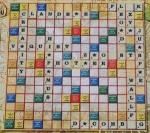 Back in March we previewed "Wildwords", a standalone board game which turns Scrabble's gameplay on its head. The title's main focus is the addition of wild tiles and wildcard board spaces which give a strong creative boost to the somewhat formulaic side of Scrabble. We saw some great things in Wildwords so we invited designer Peter Roizen to a 'virtual sitdown' of 10 questions about his game.
Back in March we previewed "Wildwords", a standalone board game which turns Scrabble's gameplay on its head. The title's main focus is the addition of wild tiles and wildcard board spaces which give a strong creative boost to the somewhat formulaic side of Scrabble. We saw some great things in Wildwords so we invited designer Peter Roizen to a 'virtual sitdown' of 10 questions about his game.
What better way to learn about a title than from the designer's mouth? Exactly.
Critical Gamers: You seem to be a man of crafty words. Would you summarize how Wildwords improves upon Scrabble's gameplay in 10 words or less?
Peter Roizen: WildWords adds more words, choices, strategy, gamesmanship, tension, and fun.
Critical Gamers: The game's asterisk tiles have an obvious impact on a player's ability to play unique words, but the wildcards also introduce a bluff word-challenge gameplay mechanic with point penalty and rewards. Could you briefly describe the system, and how the system improves upon the gameplay?
Peter Roizen: With a wild tile capable of representing a letter or a sequence of letters, it can be difficult to spot whether your opponent has played a legitimate word or not. Players don't divulge their words unless they are challenged. And a false challenge is penalized, so players don't challenge haphazardly. You have to consider not just the play, but the current score, the value of the play, and the opportunities in opens for your own next play.
My brother once played "QUA*IST" which I challenged. I thought he was pulling my leg with "QUASIPHYSICIST" or a similar construction. It was a brilliant play--"QUARTERFINALIST." Not every play will be that obscure, but you are forced to deal with some uncertainty and anxiety in every game. It creates the sort of tension you find in poker. The asterisks are like cards in the hole. And, you don't have to show them if you are not called.
If you discuss a game after it is over, you will often find the thinking or words behind various plays was not what you thought. For example, a stronger player may find a word for a weaker player's bluff and thus not launch a challenge which would have been successful.
 Critical Gamers: Where did your idea for Wildwords come from? (Was it a gradual evolution from years of Scrabble play, or did you sit down to the design Wildwords from scratch?)
Critical Gamers: Where did your idea for Wildwords come from? (Was it a gradual evolution from years of Scrabble play, or did you sit down to the design Wildwords from scratch?)
Peter Roizen: I come from a competitive extended family that hosts a family championship every year. Scrabble was the natural choice for the game to play. Anyone can learn it quickly.
One year, some of the participants prepared for the championship by memorizing the odd short words in the Official Scrabble Dictionary. I am not into memorizing lists and do not see it as a useful brain excercise. Needless to say, the memorizers had an overwhelming advantage against the non-memorizers and finished highest in the rankings.
I finished poorly for the first time and felt the Scrabble gameplay that year was no measure of a real vocabulary or clever strategy. The games even seemed somewhat dull. I set out to change the game to eliminate the usefulness of memorization and add excitement.
Critical Gamers: Does Wildwords level the playing field between Scrabble's Experts and its casual players?
Peter Roizen: Most definitely. I went to a Scrabble club some months ago and played two top Scrabble players in WildWords. These guys would have killed me in Scrabble, but I won both games by over 200 points. Mind you, playing WildWords well takes a decent vocabulary and game experience.
Scrabble skills can sometimes be a handicap. A Scrabble player with a J will be looking to place it effectively in conjunction with bonus squares as a part of a short word. Maybe "JO" which is in the OSD. A WildWords player will also be considering placing it upside down on a Turn-To-Wild square, so as to make a seven tile bonus play of a word no "J" in it. As for a play with a "J" in it, I have played "JUXTAPOSITIONAL" and "JURISPRUDENCE" once each. Scrabble players are not used to thinking about those sorts of words.
Critical Gamers: What's the optimal number of players for a match?
Peter Roizen: As in Scrabble, there are defensive and offensive considerations. You cannot take complete responsibility for the outcome if the competition is not one on one. Serious, competitive WildWords, like Scrabble, would have to played with just two players at a time.
That doesn't eliminate the fun of playing with three or four players. With four players, you could play two teams of two to have a sound competitive format that isn't subject to one person intentionally or unintentionally throwing the game to another player.
 Critical Gamers: We noticed that you removed a few of the more numerous letters from Scrabble in order to make room for the wildcard tiles. How did you determine the right balance for the new letter distribution?
Critical Gamers: We noticed that you removed a few of the more numerous letters from Scrabble in order to make room for the wildcard tiles. How did you determine the right balance for the new letter distribution?
Peter Roizen: The distribution of tiles in WildWords is actually based on the frequency of the letters used in words acccording to the Oxford English Dictionary. I believe the distribution in Scrabble was based on the distribution of letters in a typesetters kit. Because of the wild tiles and Turn-To-Wild squares, the distribution is a less important factor than it is in Scrabble. You can actually play WildWords quite reasonably in a number of Roman languages.
Critical Gamers: Does it insult you when we repeatedly compare Wildwords to Scrabble?
Peter Roizen: No more than GM would feel insulted by taking the idea of four wheels and a motor from Ford. I borrowed the basic Scrabble format and scoring system which I think is great. I changed the tiles, the board, and the rules to open up gameplay to your full vocabulary, and other skills and pleasures.
Critical Gamers: Do you have any other games in the works?
Peter Roizen: None. I never set out to invent a game or enter the game business. If I had, my game probably would have felt contrived, even crummy. I invented the game for my own purposes. Friends and family that played it on prototypes simply felt it was too good to keep to ourselves, so I published it.
Critical Gamers: Where can someone get their hands on a copy of Wildwords?
Peter Roizen: It's almost impossible to find in a store. I don't have a major distributor. The best source is my web site. There are some good discounts for two or three copies that still leave me with enough to produce more games. I think it makes a good gift.
Critical Gamers: Is there anything else you'd like to tell our readers?
Peter Roizen: I have probably played WildWords over 500 times at this point. The game has turned out to be much better than I could have anticipated. There is always something to think about. There is something to learn every time you play it. My dream is to one day watch two brilliant players duke it out for a world title. Even as a spectator, trying to guess the words or what might be a bluff is amusing.
Critical Gamers: Thank you Peter for taking the time to sit down with us.
"Wildwords" is available for purchase at the game's official website. There is also a downloadable version for those who want to play on a computermatrix over the etherweb with their friends.
Critical Gamers Staff at
Permalink

 If we were to sum up April in one word, it would be "CCGs". Sure, there was great information about the board game expansions A Storm of Swords (a game of thrones) and the Battles of the Third Age (war of the ring expansion), but the beef of the new-product news came from the CCGs. Magic the Gathering released information about the final Ravnica set "Dissension", and the Battlestar Galactica CCG website continued churning-out feature articles for the game's May tour.
If we were to sum up April in one word, it would be "CCGs". Sure, there was great information about the board game expansions A Storm of Swords (a game of thrones) and the Battles of the Third Age (war of the ring expansion), but the beef of the new-product news came from the CCGs. Magic the Gathering released information about the final Ravnica set "Dissension", and the Battlestar Galactica CCG website continued churning-out feature articles for the game's May tour.
Speaking of May releases, Critical Gamers is set to have quite the month. Tomorrow we'll have a special treat - an interview with Wildwords' creator Peter Roizen about his board game that kicks Scrabble up to eleven. May should also host some major releases including Warrior Nights, Battles of the Third Age, the Battlestar Galatica Collectible Card Game May Demo Tour, and of course the release of Ravnica: Dissension.
Hold on to your butts!
Board Games
Collectible Card Games
Gaming Culture
Critical Gamers Staff at
Permalink

April 27, 2006
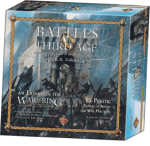 Fantasy Fight games will soon release an expansion to the very successful War of the Ring "Big Box" boardgame. The original title was a game of massive scope and only resolved after hours of play. "Battles of the Third Age" expands on the strategic portion of the title by providing new units and new cards, but it also includes two new tactical-level games: The Battle for Rohan and the Battle for Gondor.
Fantasy Fight games will soon release an expansion to the very successful War of the Ring "Big Box" boardgame. The original title was a game of massive scope and only resolved after hours of play. "Battles of the Third Age" expands on the strategic portion of the title by providing new units and new cards, but it also includes two new tactical-level games: The Battle for Rohan and the Battle for Gondor.
If the scope of the original War of the Ring is comparable to WWII's historic battle for Europe, then the expansion's battles for Rohan and Gondor are on the same level as the Battle of the Bulge or the Normandy campaign. These aren't short affairs that end when the victor takes a hill - but campaigns of battles for terrain, positioning, and the occupation of towns.
The 'mini games' (let's face it, they're not so mini) come with their own boards and rules but borrow the dice and pieces from the main game. New heroes and anti heros are added to the mix (including the nasty Gríma Wormtounge), and the new game boards sport two new gameplay tracks: "Fate" and "The Power of the Shadow". These guys tug at each other to trigger set events for the side of good and evil, respectively. It's a age-old Yin/Yang relationship of life and death.  For those folks unfamiliar with the game, the tracks are a simple series of numbers which keep track of certain momentums. "Fate" grows over time (its accelerated by the Dark player's use of the "Power of Shadow" track) and gives the Free Peoples that needed extra oomph just when things start hitting the fan. The "Power of Shadow" track is consumed by the Dark player to exercise some extraordinary abilities which seriously weaken the Free Peoples' defense. It's all somewhat reminiscent of the War Fever and Jihad gauge from "A Line in the Sand" (1991), if you ever played that one.
For those folks unfamiliar with the game, the tracks are a simple series of numbers which keep track of certain momentums. "Fate" grows over time (its accelerated by the Dark player's use of the "Power of Shadow" track) and gives the Free Peoples that needed extra oomph just when things start hitting the fan. The "Power of Shadow" track is consumed by the Dark player to exercise some extraordinary abilities which seriously weaken the Free Peoples' defense. It's all somewhat reminiscent of the War Fever and Jihad gauge from "A Line in the Sand" (1991), if you ever played that one.
From "Battles of the Third Age: Preview of the Tactical Expansion": In the Battle for Rohan the Shadow must take control of enough of Rohan’s Settlements and Strongholds before the Ents destroy Orthanc. To accomplish this Saruman has a host of Uruk-Hais, Warg Riders, Half-Orcs and Dunlendings as well as some support from Mordor Orcs. In their way stand the Lords and Captains of Rohan, their Riders, Archers and Foot soldiers as well as some of the Companions of the Fellowship of the Ring.
Will Saruman attack swiftly through the Fords of Isen to invade the Westfold, or let Gríma poison the mind of old Théoden King first? Can Éomer rally enough Riders to keep the Rohan Plains free of Orcs and will Merry and Pippin be able to rouse the Ents in time?
Read more from "Battles of the Third Age: Preview of the Tactical Expansion" on the official Fantasy Fight Games website. It's chalk-full of nuggets of tactical deliciousness, and yet not dry in the least.
Battles of the Third Age is currently slated for a May release, and is available for preorder at Funagain Games.
Critical Gamers Staff at
Permalink

April 26, 2006
 Hasbro has scheduled a face lift to bring Monopoly into the modern era before Christmastime 2006. It seems that the young whippersnappers who hang-out at night in the Dunkin' Donuts parking lot don't know where the A-Train on Reading Railroad goes anymore, and we've heard the Political Conservatives are lobbying to rename the "Luxury Tax" to the "Beer and Pretzel Tax" in hopes the working class will move to repeal it.
Hasbro has scheduled a face lift to bring Monopoly into the modern era before Christmastime 2006. It seems that the young whippersnappers who hang-out at night in the Dunkin' Donuts parking lot don't know where the A-Train on Reading Railroad goes anymore, and we've heard the Political Conservatives are lobbying to rename the "Luxury Tax" to the "Beer and Pretzel Tax" in hopes the working class will move to repeal it.
The good news is that Hasbro has created a web poll where the public can vote for the new spaces of the Monopoly Here and Now edition. When you visit the official polling site, you can zoom-in on a few major American cities and vote for 1 of 3 landmarks for each location. Folks can vote once per day between April 24th and May 12th.
Some of these choices are pretty cool - Boston's Fenway Park is an obvious no-brainer, as is the Golden Gate Bridge in San Francisco. But the idea of landing on a "Disneyworld" space and paying rent, or the thought of purchasing a hotel in the "Mall of America" makes the anti commercialism portion of our psyche cringe just a bit.
Still - it's all good fun. Vote early, vote often!
Critical Gamers Staff at
Permalink

April 24, 2006

The "rant page" at Fantasy Flight Games has a quick little overview of the design processes of plastic figurines in board games. The article follows an example piece from the upcoming Warrior Knights board game remake (which should be released shortly) from art stage to finished product. We're not talking about an in-depth Frontline piece here, but it's still pretty cool.
Enjoy!
Critical Gamers Staff at
Permalink

April 21, 2006
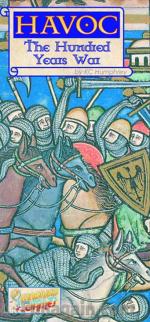 We haven't played enough Havoc: The Hundred Years War to write a full-on review, but we just finished up a session and we thought that we'd share some nuggets of thoughtfully goodness with you.
We haven't played enough Havoc: The Hundred Years War to write a full-on review, but we just finished up a session and we thought that we'd share some nuggets of thoughtfully goodness with you.
Invariably a critic's first reaction to Havoc is to classify the game as a Poker variant. This generalization shouldn't scare Families away, however. Havoc includes absolutely no betting, there aren't any chips, there's no stake in losing what you've already won. Greed is not a part of the game -- Folks with morals still 'need apply'.
The game has been skinned with a fairly heavy theme of the Hundred Years War. Historically this conflict was more a series of battles than an all-out rampage, and so each round of the game focuses on a particular battle that took place during that that war. The battles are represented by cards that list a variable number of victory points for those who place first, second and third. The rest can go walk. There are 8 battles in all, and so 8 hands of Havoc make a full game.
Each player starts with a hand of cards drawn from a shuffled deck. The cards have numbers and suits like a set of Hoyle, but because the game can involve 7 players and last 8 rounds, there are more suits than a regular deck of cards. In fact, the the card numbers climb well into the upper teens. There isn't a limit to the number of cards a player can have in his or her hand.
The game begins in the deck-construction phase, where each player has an option to spend their turn drawing two cards, or - if their content on the cards they have - they can chose to "Cry Havoc!" and set the next battle into motion. The player who 'Havoced!' must select two cards from their hand and place them onto the table face-up. Then, each player in turn has a moment to judge the strength of their opponent(s) (based on the 2 face-up cards). If a player chooses to join the battle then they, too, must take 2 cards from their hand and place them face-up on the table. The battle officially beings once everyone has either decided to field a force or sit back, relax, and let the other meatheads slug it out.
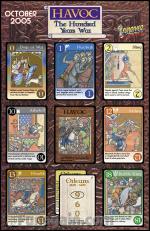 Participating players then take turns placing more and more cards onto the table (face-down) to fill out their 'army'. Players may place up to, and including, 6 cards from their hand. Then everyone flips their cards in unison, and the hands are evaluated with near-poker rules (because there are more suits and more numbers, there can be some crazy unpokeresque card combinations). To the victor goes the largest number of victory points, with second and third place often (but not always) winning a consolation prize.
Participating players then take turns placing more and more cards onto the table (face-down) to fill out their 'army'. Players may place up to, and including, 6 cards from their hand. Then everyone flips their cards in unison, and the hands are evaluated with near-poker rules (because there are more suits and more numbers, there can be some crazy unpokeresque card combinations). To the victor goes the largest number of victory points, with second and third place often (but not always) winning a consolation prize.
Here's where the game gets interesting. There are a few battles that have a boat-load of victory points, following which the "vultures" who sat-out the last battle can immediately (or soon after) "Cry Havoc!" again to swoop in and win the smaller scrappier battles. The idea is to strike while the opposition is weak.
Havoc starts to shine as a meta-game emerges above the already zany rounds of poker. Apt players must chose when to field troops, to what strength, and learn to weigh the potential spoils against the potential costs. The cost includes the potential loss of a good hand without winning the round (of course), but also the chance that they might remain weak through the next few rounds, as well.
We're definitely looking forward to more rounds of Havoc to see how new strategies emerge. Yep, it's one of those titles which evolves through group dynamics, and seriously - how can you help but love those kinds of games. Expect a full-review once we've played a few more rounds.
Havoc: The Hundred Years War is available exclusively from the FunagainGames.com online game store.
Critical Gamers Staff at
Permalink

April 13, 2006
 Fantasy Flight has posted more information about their Games of Thrones series, including the upcoming expansion,"A Storm of Swords". First off is an update the A Game of Thrones FAQ page (pdf), which includes some great info. But the beef of the update is this prize of a link: the complete rules for the Storm of Swords expansion (pdf).
Fantasy Flight has posted more information about their Games of Thrones series, including the upcoming expansion,"A Storm of Swords". First off is an update the A Game of Thrones FAQ page (pdf), which includes some great info. But the beef of the update is this prize of a link: the complete rules for the Storm of Swords expansion (pdf).
What better way to try before you buy than to read the whole rules?
Bullet points from The Company Line: - A new variant game with a new map, pitting Houses Stark, Lannister, Greyjoy, and Baratheon against one another for control of King's Landing and the Riverlands.
- New neutral houses to sway to your cause in the variant game, including House Arryn, House Frey, House Tyrell, and the many brigands, mercenaries, and broken men that people Westeros!
- Powerful new tactics cards for use in both the variant and classic games.
- New, alternate Westeros decks.
- Robb Stark, Jaime Lannister, and many others take the field directly with the new Leader rules, including two Leaders for every house (including Martell), for use in both the variant and classic games. Take hostages and execute prisoners for the first time!
- New House cards for every house (including Martell), for use in both the variant and classic games.
- A new deck of Wildling cards, making each Wildling assault a unique event!
A Storm of Swords is set to ship this June.
Critical Gamers Staff at
Permalink

April 12, 2006
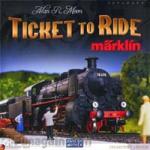 Days of Wonder's latest installment to the popular Ticket To Ride series Ticket to Ride: Märklin is now available from the official online website. The website lists a price of $39.95 for their own personal stock. FunagainGames.com will ship the product soon (they're currently only in the preorder stage right now), for a considerably cheaper price of $31.95.
Days of Wonder's latest installment to the popular Ticket To Ride series Ticket to Ride: Märklin is now available from the official online website. The website lists a price of $39.95 for their own personal stock. FunagainGames.com will ship the product soon (they're currently only in the preorder stage right now), for a considerably cheaper price of $31.95.
The titles of the Ticket to Ride series have been received incredibly well by the gaming community as a whole. Ticket to Ride is known for it's approachable and fun gameplay. If you have even a tad of rail baron blood in you then do yourself a favor and check-out this short visual overview of the game (it's one of 'dem der new fangled Moving Picture machines).
If you're afraid that a movie box might steal your soul then take a Geritol, sit back, relax, and read this peaceful analog gist instead.
Too much? Here's our short short-version: Players of Ticket to Ride construct a personal rail network with a secret agenda during the age of steam. The goal is to earn victory points by successfully routing trains to various cities on the board. Ticket to Ride is played on maps of well-known geographical regions, specifically the battlegrounds of the the great rail wars that took place in the 19th century United States and Europe. Ticket to Ride: Märklin ships with a new board of Germany, and adds two new freight types: passengers and merchandise. Here's the official skinny:
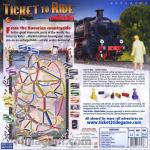
The Company Line: Ticket to Ride - Märklin Edition is the third installment in Days of Wonder's best-selling boardgame series that has won 14 international game awards, including the prestigious Spiel des Jahres. The boardmap for the Märklin Edition is based on a map of Germany and introduces Passengers and Merchandise to the Ticket to Ride gameplay.
Passengers are used to pick up merchandise worth different numbers of points along the routes that they claim. Varying stacks of merchandise tokens with different point values are placed next to the different cities on the map. Players can place one of their 3 Passenger tokens on any city along a route that they claim. On his game turn, the player can choose to then move one of his passengers from the city it currently occupies along any or all of his continuous routes, picking up Merchandise Tokens from each city he moves through. Of course he'll always take the highest remaining tokens. The point total of the tokens is then added to his score.
Sounds fun.. just watch out for German Hobos. No matter what they say, their "Hobo code" does NOT apply to outsiders, and they'll certainly cut you faster than you can say "Landstreicher!".
Learn more about Ticket to Ride on the game's official website.
Critical Gamers Staff at
Permalink

